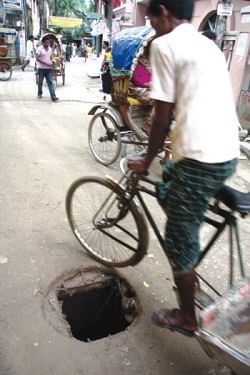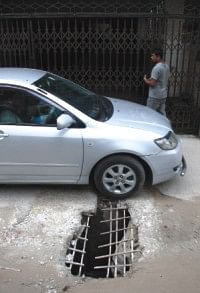|
Special Feature
Dealing with the Hazards of Dhaka
Tamanna Khan
 |
| People remain oblivious to the dangers of overhanging wires until an accident takes place. |
Everyday after her rounds at Dhanmondi Women's Complex premises, Jannatul Ferdous Bithi, a housewife and a regular morning walker, returns to her house nearby, on foot. The morning of June 29, 2010, was no different; only Bithi did not know that a wobbly drain slab near road-9A just a few paces from the Complex was going to turn her life upside down. As she set her left foot on the shifty slab, not knowing its proper condition, on end of the slab tripped, putting her left foot inside the drain, while the other end came crashing on her leg, right above the knee. Thanks to her companions, she was taken to Bangladesh Medical College immediately, and an X-ray revealed that the bone had broken into two pieces. After seventeen days and an outlay of around eighty thousand taka for a complicated surgery, Bithi returned home, prescribed with a three-month bed rest. “At first I needed help to do my daily chores- eating, bathing, toilet; I was totally bed-ridden. My daughter who does my nursing, could not attend her classes for about one and half months,” says Bithi. Besides the physical and financial strain, Bithi has to deal with the changed situation mentally, for she always fears that she may never be able to walk again. Asked whether she had complained about the slab anywhere, the answer was negative.
 |
| Stolen manhole cover can be reported to DCC or the ward commissioner.. Photo: Zahedul i khan |
Faulty slabs, open manholes, pot holes in the street, absence of street light, electric wires- jumbled up or hanging loose overhead, sometimes even submerged into rain water that accumulates in the streets due to poor drainage, dirty roads strewn with garbage are regular pictures of the metropolitan called Dhaka. Accidents like Bithi's are very common and we have become so accustomed to such incidents that we never even bother to take any preventive measures. Thus when we open the newspaper in the morning and read about a boy being electrocuted by torn wires, we at most will come up with an “tsk tsk” and move on to the next page. Even if we witness such accidents, we would immediately rebuke the invisible authority and the all-blamable “gobment”(government), and carry on with our lives with the false sense of complacency that our responsibility as a citizen is done. Our nonchalance about these hazards has gone to the extent that we fail to even perceive imminent danger. Shudeep, who prefers walking to sitting on vehicles, stuck in the traffic jams for hours, relates an incident, “I was coming to office through Farmgate when the transformer in one of the electric poles started sparkling. Those who saw the sparks quickly moved away to a safe distant, including the hawker, selling puffed rice right beneath the pole. Once the sparkling stopped everyone returned to their respective places in a manner as if nothing had happened.” It is not an uncommon scene to find rickshaws and motorcycles tripping over with their passengers having their wheels stuck at the large potholes in the narrow broken streets of Rayerbazar. A posh area like Gulshan lacks footpath and pedestrians have to compete with cars and rickshaws to make their way through the inner streets. However, we take these hazards for granted often not knowing exactly how to bring about a solution. Dilshad, who have experience of living both in Gulshan and DOHS, says, “We have a committee in DOHS, which is comparatively a small area, and whatever problems we have within the area we tell it to the committee. But it wasn't so in Gulshan, I didn't know who to talk to.” The information gap is prevalent among educated citizens like Rumana, an official of United Nations Development Programme, who complained at the police station about the absence of streetlights in her area, after she got mugged one evening near Dhanmondi road-10A.
So who is actually responsible for fixing all the problems, we face in our daily life in the areas we live and work? Besides the imperceptible “gobment”, who are we really suppose to complain to about these hazards? Digging for information, in a digitalised fashion, reveals that, certain departments of the Dhaka City Corporation are responsible for repair and development of the damaged footpath, road, surface drain, potholes, manhole covers, and street lights. The website of the Dhaka City Corporation states that citizens should directly complain to the executive engineer of the respective zone about these problems. Now the question arises how do we know who our zonal engineer is? Well, the citizen charter uploaded in the website, with its syntax error presents the information, regrettably for us citizens: it is not readable. So what is the solution? We call up the City Corporation office and ask them the zone number of our area, or even better, if we know the number of our ward we can find out the zone. How would we know the number of our ward? Unfortunately that information is not present in the website, although the names and contact number of all the 90 ward commissioners are given. Now another question comes to mind that if it is the individual citizen's responsibility to inform the City Corporation Office about the problems of his/her area then what are the ward commissioner's responsibilities? Why do we vote for them and elect them to be our representative?
 |
| It is a common scene to find vehicle wheels getting stuck at large pot holes. Photo: Zahedul i khan |
“Although the role of the ward commissioners have not been explicitly defined in the City Corporation Ordinance, we in fact, get more complaints from them as they are the elected representatives of an area rather than than through the road inspector of the engineering department. Actually the engineering department officials look more into the processing of the complaints and financial matters,” informs Dhaka's Mayor Sadeque Hossain Khoka. His statement is supported by Abul Khayer Bablu, commissioner of ward no.49; he says, “A budget is allocated for each ward every year but most of the time we need to make use of the special fund for carrying out any repair or development work of the area. If I see any problem in my area, I quickly bring it to the notice of WASA (Water Supply and Swerage Authority) or Dhaka City Corporation whoever is responsible for the problem.” He further says that development and repair works are done in three ways, one through contract basis where tender is placed for huge works, term contract, through which mostly repair works are done by fixed contractors of city corporation and lastly through a squad which is a group that works in the VIP roads and streets where ministers and MPs live. Both the mayor and the commissioner however emphasised on the role of the conservancy department's inspector and supervisors about informally placing complaints about the problems of the streets as they visit the streets on a regular basis.
Even though there are no strict rules and regulations or clear-cut guidance of who should do what, as citizen we can do our part of informing the proper authority instead of grumbling about the problems. So next time you trip over a electric wire, or get mugged in the dark corners of your street, or break a bone over a open manhole or pothole, try to contact your ward commissioner, or city corporation engineer and bring the problem to their notice. As citizens our responsibility goes a little further than sighing and blaming the government for everything that goes wrong with our lives.
Copyright
(R) thedailystar.net 2010 |
| |
